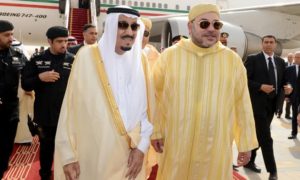 In Algeria, neither Algerian leaders, nor Polisario leaders were expecting such a heavy blow: the announcement of a summit between King Mohammed VI and the leaders of the Gulf Cooperation Council, on April 20 in Riyadh.
In Algeria, neither Algerian leaders, nor Polisario leaders were expecting such a heavy blow: the announcement of a summit between King Mohammed VI and the leaders of the Gulf Cooperation Council, on April 20 in Riyadh.
According to informed sources in the Polisario headquarters in Tindouf, disarry in Algiers is all the greater that this summit, the first of its kind, between Morocco and the powerful Gulf states is additional evidence to the success of Morocco’s Arab diplomatic strategy.
While Algeria has constantly nurtured hope to isolate Morocco on the diplomatic scale to have free room to continue its harassment actions on the Sahara issue, the summit marks a powerful diplomatic upswing for Morocco, to Algerians’ displeasure.
According to the same sources, Algerians’ concern is understandable as they know the support the influential Gulf States extend to Morocco in the Sahara issue. This support was renewed by the foreign ministers of the GCC countries on April 7 in Manama, during their meeting with the US Secretary of State John Kerry.
The Saudi Foreign Minister, Adil al-Jubeir, had stressed the importance of supporting the autonomy plan presented by Morocco to end this regional conflict. GCC Foreign Ministers had also warned against any decision likely to weaken the Moroccan plan.
This position is totally opposed to that of Algeria, whose leaders and military Generals are sparing no effort to derail the autonomy proposal, preferring to perpetuate the conflict regardless of the harmful impact of their actions on their relations with Morocco.
Another source of concern for Algeria is that in addition to the economic and diplomatic support that the Gulf Arab countries will extend to Morocco, the Riyadh summit would be marked by the announcement of a military support as well.
The aim will be to restore the strategic balance with Algeria whose military spending exceeded $13 billion in 2015, in addition to huge contracts signed this year.
